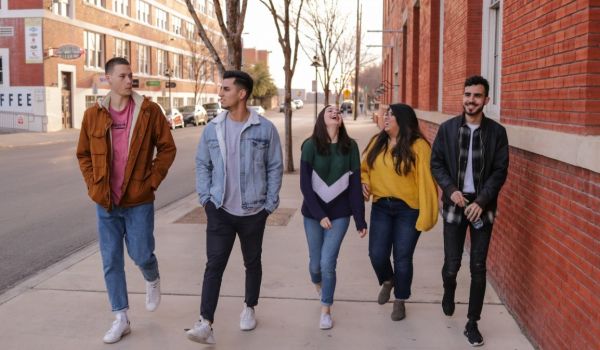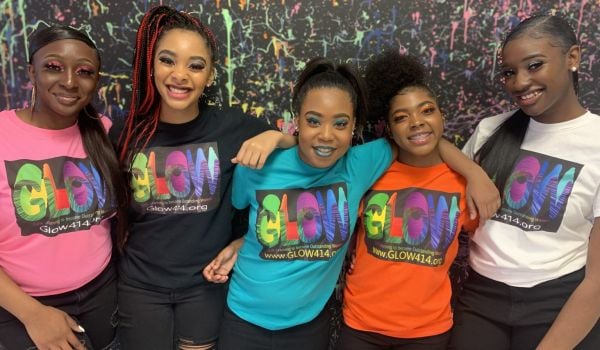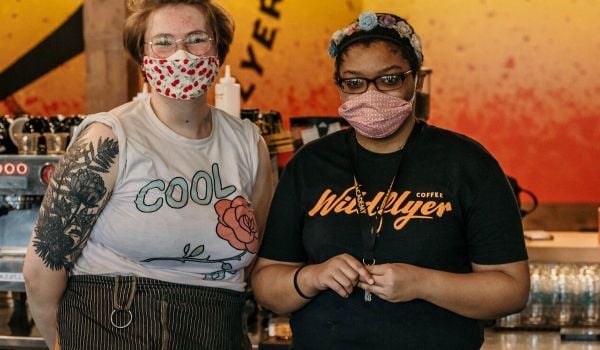When Tailon Penn first heard about an app that would pay her to build life skills, she figured it wasn’t legit. But it was. The app, DreamKit, provides unstably housed youth digital activities that help build life skills, then rewards them with gift cards after each activity is complete.
Penn, a 21-year-old based in New Haven, Connecutict, started completing activities on topics like meditation and mental health. (The app selects and curates each activity, from reading an informational article on Learning How to Meditate to watching a TedTalk on the power of vulnerability.) She used the resulting $5 gift cards to help pay for essentials. If she had any questions about DreamKit, she went directly to 26-year-old founder Marina Marmolejo, who is based locally.
“Marina is very available,” Penn says. About two months ago, Marmolejo asked Penn to join the team as Dreamkit’s sixth paid Youth Specialist, and Penn began outreach to other unstably housed youth to bring them on the app.
“When we both have had the same experience, it’s easier for them to take in the information,” Penn says of her work. “We feel connected on another level.”
Since DreamKit incorporated as a nonprofit in the summer of 2019, the app’s incentive-based model not only helps youth participants learn life skills, it enables DreamKit to develop job pipelines for their participants and connect them positively to the greater New Haven community. “As a society, we do a really good job at tracking negative behaviors,” Marmolejo notes. “We don’t do a good job, at all, of shouting from the rooftops of how incredible our young people are.”
Marmolejo was finishing her masters in public health at Yale when she began collaborating with professor Yusuf Ransome on the idea. Early feedback suggested that unstably housed youth — who have different competing priorities — should be incentivized to participate. That resulted in DreamKit’s “points based economy,” as Marmolejo calls it, that “gamifies the skill-building behaviors, by financially compensating young people for building skills and engaging in services.”
DreamKit launched as an app this February with bright, upbeat branding. “A lot of young people don’t self-identify as homeless, but are sleeping in their cars, couch surfing or sleeping in shelters,” notes Marmolejo. “We’ve been really intentional about distancing ourselves from that stereotypical homeless systems services feeling, being as bright, bubbly and young as possible.”
Pre COVID-19, youth made DreamKit profiles and received points for attending in-person events like case management meetings. This March, pivoting due to the pandemic, DreamKit launched a pilot with about 40 New Haven youth offering digital-only resources that include how-tos on resume writing and explainers on sexual health and consent.
After completing an activity and filling out a feedback form, youth participants receive a $5 gift card. They can receive money for up to 10 activities per week, earning up to $50 per week through the app. Since the pilot launch DreamKit distributed roughly $5,000 in Walmart and GrubHub cards to help cover essentials like food, clothing and hygiene products.

Marina Marmolejo
Maddigan also helps update DreamKit Profiles, where the app tracks each participant’s completed activities and money earned. The idea is to create a positive profile of each user that can be shared with the New Haven community. “We want to show an objective data set that highlights young people’s progress in a way we’ve never seen before,” Marmolejo says.
She believes these profiles can lead to job opportunities. The DreamKit team is now reaching out to New Haven employers to understand what skills they look for in young employees and any hesitations they may have about hiring an unstably-housed youth. To address the latter concern, DreamKit is working with the Department of Labor to potentially subsidize the first four weeks of a youth’s employment.
The team will also use employer feedback to inform its activities. Marmolejo envisions an entire pipeline: “We conduct interviews with employers who want [certain skills], we send that data to the activities team to build out activities in real-time to reflect the employers need, and go back to the employer with a list of youth who completed those activities and have those skills,” she says. “And we’ll be able to subsidize their first four weeks of employment so there’s literally no risk to you. What do you say?”
So far, DreamKit has helped place 17 youth in jobs, including Penn. “I’ve learned so much,” Penn says about her first few months as a youth specialist. Marmolejo also looks to Penn as an expert of her own lived experience — for DreamKit’s latest social media campaign, for example, she tapped Penn to handle directing.
Marmolejo hopes to elevate even more youth into leadership positions: “My vision is that half of our staff is young people with lived experience, if not the majority.”
In expanding, Marmolejo is focusing on corporate sponsorships to help subsidize DreamKit’s incentive model: “The idea is partnering with retail and grocery stores, like Targets and Walmarts, seeing if they can donate gift cards to use as our incentive model.” She’s also eager to further explore digital opportunities in the age of COVID-19, like virtual career days for DreamKit youth.
Marmolejo stresses that even though DreamKit is an app, it’s a community-specific model focused on New Haven youth and connecting them with local community resources and employers.
“The best way to scale to other cities would be to build out how DreamKit works in New Haven and we can share that infrastructure to community leaders in other regions or cities,” she says. “This is beyond making sure the programming is running well — I have to be out in my community at the same time as I manage the app.”

Emily Nonko is a social justice and solutions-oriented reporter based in Brooklyn, New York. She covers a range of topics for Next City, including arts and culture, housing, movement building and transit.
Follow Emily .(JavaScript must be enabled to view this email address)
















